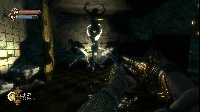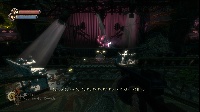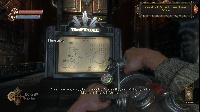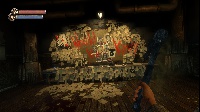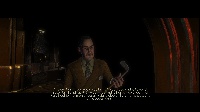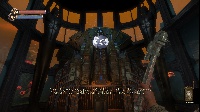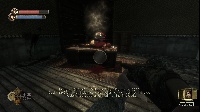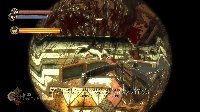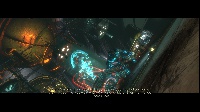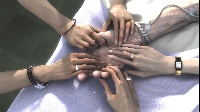Bioshock
Playtime: 15.7 Hours
Finished 02 March 2024.Played the remastered version on my PC on the hardest difficulty, which still isn't particularly difficult. I kept the Vita-Chambers feature on, but generally reloaded when I died so basically never used them. I saved all the little sisters since there's very little difference in total ADAM collected and a pretty big difference in the rewards you get otherwise; didn't use Hypnotize too frequently but it was good when I needed it.
Also, the bonus museum in the remaster with all the concept models and early concept art is super cool - I had a fun 20 minutes or so looking through that. Really cool to see how enemy concepts sort of started out as horribly disfigured creatues almost reminiscent of System Shock's hybrids before taking on a more demented-humanoid look seen in the final game.
This game is technically a successor to the System Shock games, but is a very starkly different experience as this was very much designed as a console title, rather than a PC title. This felt relatively clear from the UI, which is very large and quite obtrusive (especially the giant weapon viewmodels) and there are quite a few minor control settings that feel a bit stilted when playing with a keyboard and mouse. Good examples of that include many shop/interface controls and the fact that you can't use plasmids without explicitly switching to them for some reason. From what I remember (potentially incorrectly), the original Bioshock also had quite a restrictive FOV, but it's fully selectable in the remastered version. The only abberation for this is when you have the Big Daddy suit on near the end of the game, which ends up blocking a massive part of your screen because of the increased FOV and screen space. These are relatively small complaints though, since the baseline experience is great - the remastered graphics render Rapture beautifully, the game's performance was flawless from start to finish, and lots of core mechanics (ex. moving, aiming, and even small things like weapon and plasmid switching) feel great and perfectly responsive.
Generally speaking, my positivity translates towards the majority of the combat feel in this game - but there are so many small details that just feel unrefined in this game, kind of reflecting the awkwardness of System Shock 2's combat but almost a decade later. For example, a minor gripe is that a lot of the weapons don't have as much impact on an enemy as I expect, or otherwise feel "off". Crosshairs look pretty disgusting (most of them are giant circles in the middle of the screen) and are actually all off-center in different ways for each gun! You can see this by rapidly scrolling through your equipped weapons, taking care to note that the circles, stars, crosses, etc. all center on different parts of the screen (in my case, I was playing in 4K resolution - maybe this isn't the case for other resolutions/aspect ratios?). This kind of explains why the machine gun feels strangely inaccurate, and just generally makes the shooting experience a bit worse. Part of this is probably just me, since I really like having a nice small dot or cross that shows me exactly where I'm aiming (leaving spread & projectile drop up to my interpretation) but this game has no option for that. Beyond the crosshairs, weapons all feel a bit chunky and slow, taking a while to reload.
Plasmids are designed mostly as very simple "magic spells" in this game, as opposed to some of the more creative options from Infinite. That's not to say they're useless, but they definitely feel like cheap, spammable support skills as opposed to huge game changers - spamming shock on turrets, cameras, and enemies is good enough for most of the game and there's not too much incentive to explore other options. Burning, freezing, sending a bug swarm, etc. - all of these things all basically do damage and disable enemies in various ways. Since you have to actively swap away from your weapon to cast a plasmid, I felt that it made it a pretty tough choice to use most of the time. This is especially true towards the later parts of the game, with damage upgrades from research and a variety of powerful tonics to make my own arsenal even more potent; disabling & stunning an enemy is simply less useful than instantly killing it with crossbow bolts, shotgun spam, or some well-placed grenades. Honestly, if these were usable without switching weapons the experience would have been so much better overall; thankfully, I believe this is a key change that was made for Bioshock 2 and beyond.
Enemy design tends towards being fun, with really cool concepts of the splicers and Big Daddies. I kind of wish you actually saw more plasmid variety from these guys though, since despite being conceptualized as ADAM-addicted plasmid hounds, it seems that only the Houdini splicers actually use them on you. I have some concerns about the balance, particularly with the leadhead splicers - since for some reason they have like 5x (not an exaggeration) the HP of the other types, no idea why. For better or for worse, it's super easy to circlestrafe all of the smaller human enemies and just whack them to death with the wrench - so it doesn't make a huge difference. The Big Daddies only have 2 variants in Bioshock 1 - and the Bouncers are surprisingly rare for some reason, despite being the most recognizable enemy in this game (and arguably the series). Each area only has 1 kind of Big Daddy, and the areas with Bouncers have less Little Sisters roaming around on average - so you don't get to fight them much. They're the closest things to proper boss fights, and the fights are truly quite tough since they are designed to be both tanky and mobile, and hit like a truck compared to the splicers. Without preparation, it's still not too bad to take one on, but I realized very late that setting up a few traps before baiting them into a fight is basically a guaranteed instakill which basically defeats the challenge. I'm not sure if this was the case in the original game, but a huge hazard of these guys is that the Rosies essentially have aimbot and all of them can instantly hit you the moment they un-stun. I didn't really fight any turrets since I hacked them all (see below) and the final boss is pretty unremarkable mechanically so there's not much I can say about those now.
I think I might have trivialized my playthrough by focusing a ton on hacking. The minigame is a pretty simple pipe maze puzzle, where you have to rearrange pipe segments on a grid to redirect a flow of water from one point to another within a time limit without directing it onto a bomb or alarm panel. It's as simple as it sounds, and doesn't evolve by much throughout the game outside of a higher ratio of danger panels and some resistor/accelerator pipe types. By going out of my way to hack almost every camera, turret, and security bot in the game, a ton of the ambush waves would just get killed offscreen after they spawn which meant that I could just saunter my way around every map after the first 10-15 minutes. When I first tried starting the game on the Steam Deck, I found the console controls to be really annoying - but playing it on the PC made it really easy since precision & speed is easy when clicking and dragging the pipes around. Also, picking all of the safes made it even easy to reach the supply cap on money, hypos, ammo, etc. - which massively helps out survivability in tougher fights. Part of me thinks I should have probably killed more of the robotic enemies instead of converting them to add some challenge, but the utility was too much for me to resist. Not having to worry about spawning or respawning enemies and also having distractions when fighting Big Daddies made my life so much easier - imagine if I could do something similar in System Shock.
I don't think that there is very much I can say about the plot or the environment of the game that hasn't been said to death pretty much everywhere else. I technically spoiled myself on the plot about a decade ago when I watched an LP of this; at that point I didn't think I was ever actually going to play it. Even so, I'm a big fan of the way that all the plot and background exposition is presented - most of the context of the ruined Rapture is hidden behind audio logs found around the world in a way similar to the System Shock games. The big twist still felt impactful to me even with full knowledge that it was going to happen - it's cool how you can see so many hints about Fontaine's character, Ryan's suspicions, and all of the audio logs that hint at the bastard child, mind control, and so on. The rest of the story tends to be quite simple - go here and do that - but it's the way that these simple objectives and roadblocks are wired into the theme of Rapture's philosophy that makes this such a clever work. The writing is extremely meta and the end of the day, but there is such an earnestness to it in such a way that it's truly a commentary on the linearity of games without giving smarmy fourth-wall nudges at the player. In my opinion, this is an aspect of video game writing that has been sorely absent in major games in more recent times, and is a big reason why this game really holds up well over time, without feeling particularly dated at all.
Overall, I think the world of Rapture was crafted masterfully and the writing of all the major characters in this play was no less amazing. Almost every aspect of this game feels distinct and timeless, which is something that very few other games can hope to achieve. It's quite amazing how no other game outside of the series has ever attempted something even remotely similar, since that tends to happen in the industry to force a market for players who want more of the same. Think of all the generic souls-likes, or basic fantasy games, or uninspired "Japanese-style" action games that keep getting dumped out by big companies, most of which just feel like attempts at recapturing the feel of the original title. In Bioshock's case, I'll choose to believe that it so thoroughly nails the aesthetics and mechanics of the world to the point that no other imitation could recreate the magic of Rapture. Despite my annoyances with the game's mechanics (which peeved me enough that I'm not particulary interested in ever playing the game again), I think this was a wonderful game that I definitely needed to experience for myself at least once.

